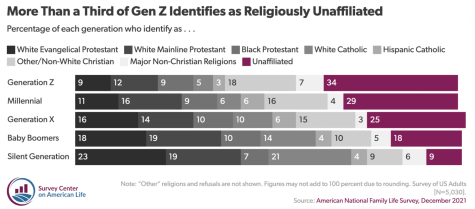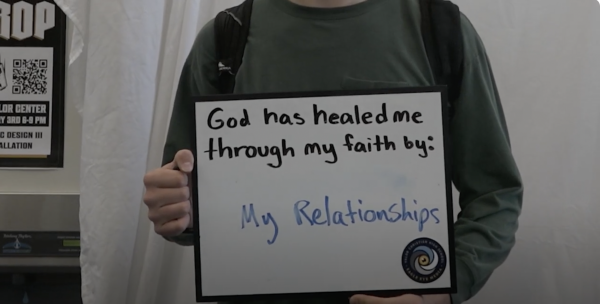Generation Z and the Church
According to Pew Research Center, 15% of Generation Z claims they were never religious— marking a 50% increase from the previous generation. Additionally, a Barna study finds only 4% of Gen Zers (ages 11-26) hold a “biblical worldview.”
To understand today’s youth rejection of organized religion, current cultural trends provide some clues and context. For starters, many of these changes are not unique to Gen Z. Modern society as a whole, specifically modern western culture, is losing traditional values. Gen Z is right in the middle of these changes, but they are not unique to just one generation.
“A lot of the values that past generations have held definitely have dropped,” explains Melanie Martin, a junior at Valor Christian. From more subtle changes in pop culture, to moral values to identity and worldviews, culture seems to be in what Professors Neil Howe and William Strauss called “a fourth turning” — an epoch of rapid societal change and reorientation. Gen Z appears to be in the drivers’ seat for many of these changes.
In what could be one of Gen Z’s most significant rebellions, young people appear to be leaving institutions from which many older Americans derived their meaning. Traditionally the Christian Church has constituted the moral framework of many Americans, but this generation is leaving organized religion faster than any other group.
“We are a lot less religious than previous generations,” says Cadin Dinneen, junior at Valor Christian. “The Church has essentially lost its place in the western world. People don’t adhere to religious doctrines anymore, and I would say at least 70% of Generation Z probably don’t really have any meaningful belief in God.”
The Pew and Barna studies validate the claim Gen Z has unified to demand change and undermine more traditionally held values — in some cases including the Church. But as youth culture drifts away from traditional values and authorities, young people are now looking for meaning in themselves and/ or sub-group identities, enabled by tech-powered social connections.
“I found that Gen Z is very apathetic about faith in general,” Jeremiah Zeigler, head of spiritual formation at Valor Christian explains, “but also there’s like a longing. So [Gen Z is] apathetic about Christianity, but they’re longing for an identity.”
Barna reports 13% of Gen Z consider themselves to be atheist, almost double the next highest generation. Additionally, a SocialSphere study shows only 28% of Gen Z attend Church at least once a month. This research showed the decline in youth participation in Church and overall decline in the western Church as a whole, but also a decline of belief in any sort of higher power.

So why are younger people leaving the Church so rapidly? One hypothesis for the decline: Church doesn’t fit into modern lives.
“Part of it is life gets busy, it gets more difficult [to go to church],” Lauren Book, a junior at Valor Christian says.
Christianity also challenges people to consider God, other people — to endure hardship and challenges that can be inherently uncomfortable. The current culture preaches efficiency, ease, and comfort. For Gen Z, they want their spiritual life to follow these same expectations. And when it doesn’t fit, they find other, easier forms of spirituality found in astrology, nature, and even crystals.
“Instead of staying with one identity, or one thing, or developing and growing through struggle,” Zeigler says, “I think the challenge for a generation Gen Z is there’s so much available that they can just pick and choose when they want it when they need it.”

Some believe the Church has also fallen behind Gen Z’s value system. As junior Lauren Book says, “I don’t think churches adjusted in time to still bring people in, [and if] churches fall behind, Gen Z is not gonna continue to attend.”
 Gen Z may be challenging the traditional Church system, but their desire for purpose remains.
Gen Z may be challenging the traditional Church system, but their desire for purpose remains.
“I do feel like there is suspicion of the church and leadership, maybe more than previous generations,” Katie Gayle, Executive Pastor of Ministry at Wellspring Church in Englewood, said, “but then there is also a desire to be rooted in something bigger than themselves.”
Although not exclusively a Gen Z phenomenon, identity, and a search for a meaningful one through group identification, like race or sexual orientation, has seemingly gripped the youth most poignantly. In some respects, identity is Gen Z’s new God.
“Gen Z specifically is more in tune with themselves,” says Book. “They kind of know the people that they love, like what they desire. Gen Z is [also] more in tune in their ability to kind of distinguish and identify what is morally right and morally wrong.”
Although Gen Z may be increasingly less religious, the generation’s longing for meaning and purpose has not dwindled. Gen Z wants to find genuineness within a world of plastered facades and sterile materialism. Within Gen Z’s skepticism of the Church, today’s youth more than ever is leaning on themselves to define their identity and meaning for themselves.
“[In the loss of religion] one thing that will inevitably happen is that society will become more individualistic and more isolated,” Dinneen explains. “In the absence of organized religion, people with nothing else to focus on they’re going to focus on themselves. They go and find meaning in what they do rather than what the community does.”
But what happens when this fails to satisfy and answer the big questions?
“Gen Z is looking for connection and authenticity,” Ziegler said. “I’m very hopeful for Generation Z…Honestly, because they’ve been able to see through a lot of the minutiae of religion, and Gen Z wants what Jesus was.”
So for 85% of Gen Z who do have a religious background, the Church may remain important and foundational. And although some in Gen Z are turning away from the Church faster than previous generations, many Gen Zers possess a deep, meaningful faith.
“I’m actually amazed by how many young people want the liturgy, want something that they participate in, and want a connection to something bigger than one specific church,” Galye said. “It’s really beautiful.”
In other words, Gen Z and their critical eye will either lead them away from the church or toward it. Gen Z is growing into sharp and deep thinkers, but some believe this is what the Church needs next.
“I long for this younger generation to see themselves as leaders in the church,” Gayle says. “to know that their voice matters and we want to see them lead revival in the church!”
Gen Z is seemingly rejecting a neutral “middle ground” perspective on the church. They are either rejecting the Church or moving toward God in a deeper, more authentic manner. Where this path leads is yet to be determined, but like all things Gen Z — this journey for purpose and meaning will be documented online, shared with friends, and strive to be meaningful.
Your donation will support the student journalists of Valor Christian High School. Your contribution will allow us to purchase equipment and cover our annual website hosting costs.

Kenna is a junior at Valor and moved from Minneapolis this summer. She is interested in art, culture and Chinese, and hopes to continue learning about...





























